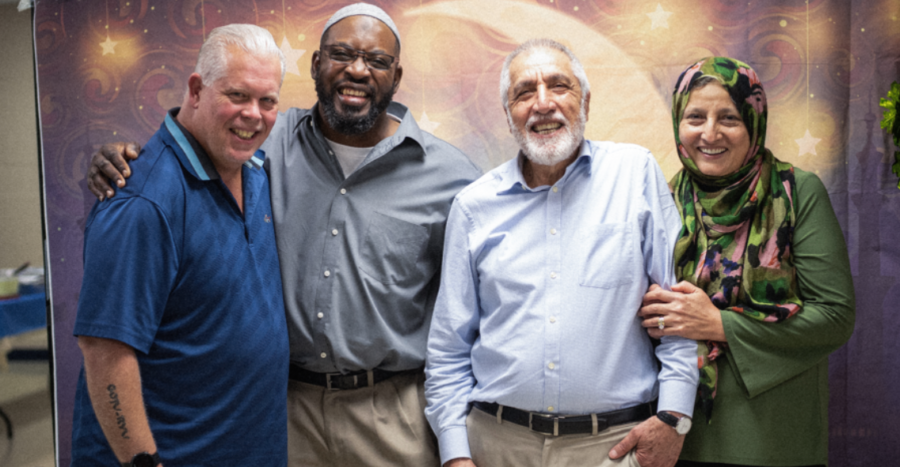Several years ago, an unfamiliar man showed up at my little mosque, a squat brick building on the side of a four-lane highway in Muncie, Ind. He had a large U.S. Marine Corps logo and a sketch of a small skull with a lightning bolt tattooed on his right arm. His face was flush, he barely made eye contact, and his fists were clenched. He seemed angry.

Opinion A stranger planned to bomb my mosque. He became a member instead.
Naturally, we saw potential danger. In these days of intense cultural division, hatred against Muslims is palpable, and our places of worship have been the targets of terrible crimes. But we also sensed vulnerability in this stranger. My husband, an Afghan refugee and a gentle physician, welcomed the man with a heartfelt hug. Later, I sat alone with him in our mosque library — to share a smile and ask his name, to offer comfort and show him respect.
Why, you might ask, would I put myself in this position? When I was a young girl growing up in Afghanistan, I met troubled men like this at the homeless shelter run by my father. And when I fled the war in Afghanistan to a refugee camp in Pakistan as a teenager, I cared for many needy people. I have always believed in the idea that we must welcome the stranger, the person in need. And that if we search for common ground with all those we meet, we will discover our shared humanity, and we will all be better for it.
As the stranger and I sat on a green vinyl couch, surrounded by leather-bound books, he finally started to make eye contact. I learned that his name was Richard “Mac” McKinney, that he had served 25 years in the military, and that he had a wife and daughter. Over the next few weeks, Mac began making regular visits to the mosque, joining us for meals and sharing stories about his family and his time in the military.
I continually looked for ways to help him feel valued by entrusting him with responsibilities around the mosque: leading meetings, participating in prayers, even standing by the door as our resident security guard. I could tell this gave him a sense of purpose. Not long after that, he joined our community of about 200 by becoming a member of the mosque.
It wasn’t until months later that I heard unsettling rumors. Some congregants claimed they’d heard that when Mac first came to the mosque, he was on a reconnaissance mission. That he’d built a bomb to blow up the mosque and murder us.
I knew immediately what I needed to do. I invited Mac to my house for a meal of traditional Afghan food: homemade bread, chicken, kebabs, rice, eggplant, a green yogurt dip seasoned with cilantro and lime. He devoured the food. When he was done, I looked him in the eye.
“Is it true, Richard?” I asked. “Were you planning to kill us?”
He looked down. He was ashamed but answered honestly. He confessed that when he had first arrived at the mosque, he had planned to murder us by blowing up the building with an IED he had built himself.
“What were you thinking, Brother Richard?”
He explained that in the military, he had been at war with Muslims for years, and that he had developed a deep hatred in his heart. But he went on to say that the way we had treated him, with compassion and kindness, had changed his mind. He said we had given him a place to belong. We had shown him what true humanity is about.
Of course, these stories don’t always go this way. In 2015, at the Emanuel African Methodist Episcopal Church in Charleston, S.C., Dylann Roof entered a Bible study as a seemingly curious participant but quickly transformed into a terrifying mass murderer, killing nine church members. Events like this are horrifying. But I refuse to give up hope.
We live in a time in which people have stopped talking to those who don’t share their views. It’s easy to despair. But I believe that if we continue down this road, we will never understand one another, never find our shared humanity, never have peace. If we truly want to heal our society, we need to find forgiveness in our hearts.
That’s why, in the end, our community chose to forgive Richard and allow him to remain. In fact, he not only stayed with us but also became president of our little brick mosque on the edge of the highway.
I realize that not everyone will be faced with a situation as extreme as ours. But today, tomorrow or next week, you might meet a stranger, someone who looks or thinks differently from you. It might be easy to ignore this person, to look the other way. Instead, I challenge you to smile. Ask their name. Learn a little about them. You might be surprised at what can happen.
SOURCE: https://www.washingtonpost.com/opinions/2023/01/25/bibi-bahrami-stranger-at-the-gate-mosque/

